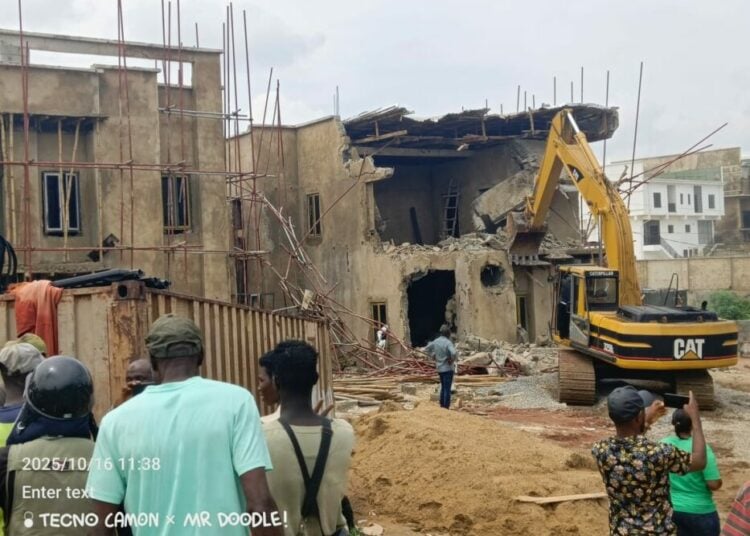The Federal Capital Territory Administration (FCTA), on Thursday, demolished a nearly-completed mini-estate in the Dutse District of the FCT, asserting that the developers ignored repeated warnings that the land was unsuitable for construction of houses.
The estate, located on Sam Mbakwe Street near Cedar Crest Hospital and had over 10 duplexes and four two-storey duplexes, was illegally built under a high-tension power line and within a stream channel earmarked for a future bridge.
Leading the demolition, the director of the Department of Development Control, Mukhtar Galadima, revealed that the developers applied for a building plan permit but were explicitly denied due to the dangers associated to the location and planned infrastructure.
“They requested for approval and applied for building plan approval, which we declined for the fact that it’s in close proximity to high-tension line, as well as a stream channel. So, we declined to grant approval, but they moved ahead to work,” he said.
He detailed that his department served stop-work notices at every stage of construction, starting from the initial excavation.
“We even communicated to them in writing that the work should be stopped. But unfortunately, maybe considering their institution and agency, they moved on,” he added.
When asked why the FCTA allowed the structures to reach such an advanced state before acting, Galadima was unequivocal, placing the responsibility on the developers.
“As a reasonable institution, once you are served a notice, it should stop. If you don’t respect it, we will allow you to waste your money and we will bring it down,” he said.
While the FCTA director confirmed that the plot was allocated in error, he firmly ruled out any financial compensation for the loss of the structures.
“Compensation is given to any property that has approval. In this context, no approval, you were asked to stop at the excavation stage, you didn’t comply, so there’s no compensation,” he said.
In a significant new policy direction, Galadima announced that the FCTA would begin to charge offenders for the cost of demolition.
“It is one of the important aspects of urban regional planning law that whatever structure has been demolished, it has to pay. So now we are going to sit down with the legal secretariat to see how we can start enforcing this aspect of the law,” he said.
He confirmed that new equipment for demolition, approved by the Federal Executive Council (FEC), was being procured to enhance the department’s enforcement capabilities.
Galadima recommended that the developer should formally apply to the FCT Administration for an alternative plot of land.





